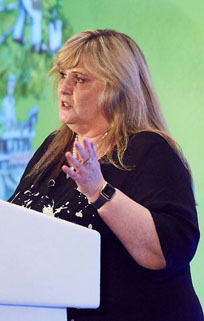Comment / Understanding accountable care
This was a fitting occasion to be asking such questions as the event brought together the HFMA’s traditional Provider Finance Faculty and Commissioning Finance Faculty summer conferences – demonstrating the association's own switch to systems’ thinking.
Delegates may not have walked away with a definitive answer – speaker after speaker stressed how these new organisations or alliances might look very different in different areas. But they left with a certainty that this is the clear direction of travel, a good idea of some of the obstacles that have to be overcome and an insight into how the most advanced areas are starting to turn theory in to practice.
So what do we know? ACSs – because that is a much more likely starting place than a single organisation given the current legislative framework and concerns that formal mergers could be a distraction – will involve an alliance of providers delivering population-based integrated healthcare. What that means is that they will take responsibility for a whole population paid with a capitated budget that covers the provision of all services.
ACSs may spell the end of the purchaser 
provider split – an argument put forward
by the King’s Fund’s project director Ben Collins (pictured). They certainly mean a different, more strategic role for commissioners in future, with some current commissioner activities transferring to the ACSs or ACOs.
ACSs would work under a contract that specifies outcomes (not interventions) and that might last several years.
They would understand their populations, using stratification techniques to identify those elements of the population most at risk of hospital admission so they can be supported to avoid those admissions. They would also focus more on prevention.
Again a clear aim is to deliver value – delivering the right intervention in the right place and at the best cost for the system as a whole, actually taking costs out rather than simply shifting costs around the system. To use the jargon, with ACSs and capitated budgets, the incentives would be ‘aligned’.
We know ACSs will need great data and IT 
and they'll need the right budgets and incentives
in place. But as King's Fund chief executive Chris Ham (pictured) told the conference, these ingredients would be essential but not sufficient. Where integrated systems had worked well – Kaiser Permanente and InterMountain Healthcare in the USA for example -- the key challenges were sociological not technical. Leadership and relationships hold the key.
This is perhaps particularly the case given there are clear legislative and regulatory barriers to progress – with statutory organisational accountability fitting uncomfortably with non-statutory system accountability. He encouraged systems to overcome these barriers by challenging them, rather than accepting them.
We’ve already been told – by the Next steps on the five-year forward view – that ACSs will be evolved sustainability and transformation partnerships (STPs). In reality, there may be more than one ACS in an STP area – Nottinghamshire is a good example.
Terms such as PACS (primary and acute care systems) and MCPs (multi-specialty community providers) may slowly disappear. They are just different names for alliances of organisations aiming to deliver more integrated care. One model (MCP) focuses on out-of-hospital care, the other adds in acute care. But we are already seeing a blurring of the boundaries between the two approaches. For example Stockport is an MCP but it has high profile acute provider involvement.
Different models of ACSs are emerging ranging from horizontally integrated alliances of providers to vertically integrated models such as at The Royal Wolverhampton NHS Trust, where a rising number of GPs are now employed directly by the trust. While GPs need to be at the heart of accountable care, perhaps increasingly through GP federations, many see foundation trusts and trusts as the more obvious candidates for taking a lead role in any ACS or ACO that emerges, arguing that they are better placed to take on many of the risks.
Jamie Foster, a partner with law firm Hempsons outlined seven steps that needed to be considered in delivering accountable care
- Phasing – it’s a five to 10 year journey and big bang approaches will fail
- Partners – be clear about who is in and who’s out.
- Governance – STPs have no formal powers to make decisions so leadership needs to refer back to partner organisations
- Contracting – in the short term new model contracts are likely to sit alongside existing contracts
- Funding – there needs to be a transition to population budgets
- Organisational form. The care model should come first, but knowing your preferred organisational form can be helpful to make progress on the model
- Enablers – need a focus on workforce, safer care, technology and innovation
KPMG partner Mark Britnell (pictured) echoed 
the ‘ACS is a journey’ comment. 'Accountable care takes will, skill, time and persistence,' he said, suggesting that while there were some early wins, complete reform could take 20 years before it achieves its full potential in terms of outcomes and cost reduction. Workforce development was the stand-out requirement for him, adding that a 'demoralised and exhausted' workforce was not a good foundation for system reform.
Elsewhere in the conference, delegates heard concerns about accountability. Could systems actually be accountable?
And while there was agreement that getting a new care delivery model in place was the all important first step, moving to capitated budgets was a necessary next step to underpin the required system-wide behaviours.

Mid-Nottinghamshire’s Better together programme has made some significant progress in setting up a capitated model and will go live with musculoskeletal (MSK) services later this year. Its sophisticated payment
model takes current spend as a starting
point but builds in known costs of new delivery mechanisms and allows time for acute providers to eliminate stranded costs. There is also a mechanism for sharing gains and losses.
MSK was seen as a relatively contained and
straightforward place to start, with a new triage service enabling direct access to physiotherapy services for appropriate cases without a consultant outpatient appointment. Marcus Pratt (pictured), associate chief finance officer for the two involved clinical commissioning groups said the funding system had taken time to finalise but would not be onerous to run.
Gary Andrews (pictured below right), senior pricing development manager at NHS England, said that the mid Notts model had drawn on emerging guidance from the centre, and the guidance had also benefited from mid-Notts’ experience. A finalised version of a Whole population handbook is expected to be published in July to support the broader accountable care movement across England.
One of the clear aims of new payment  approaches is to avoid some of the perverse incentives perceived to be part of the current funding approaches.
approaches is to avoid some of the perverse incentives perceived to be part of the current funding approaches.
Volume-based activity payment for acute providers and block contracts for community services mean neither type of provider is incentivised to develop a new community service that reduces inpatient admissions or outpatient appointments,for example.
But Mr Andrews said it would be important to ‘ensure existing barriers and perverse incentives weren’t replaced with different barriers and perverse incentives’. In the meantime, the tariff will continue to have a role, helping to inform budgets and providing a mechanisms for moving money between systems.
All the sessions and workshops relating to accountable care at the conference were busy. It is undeniably the hot topic right now. There is still a huge amount of uncertainty around what it means in different locations, what infrastructure is needed to facilitate the change and what the different roles are locally and centrally.
But it is clear that ACSs – and perhaps beyond that, ACOs – are the clear direction of travel. Given the huge workload currently and day-to-day challenges of delivering existing services within a difficult financial settlement, perhaps the over-riding question is how quickly systems can make progress.
For many, the challenge must seem daunting. 
But there is encouragement from across the
world that the prize is worth pursuing. Carolyn Gullery (pictured), general manager for planning funding and decision support at Canterbury Health Board on New Zealand’s South Island told delegates exactly what could be achieved with an integrated, system approach to health and social care. With similar pressures back in the mid 2000s to those facing the NHS now, the health board has introduced a new integrated service model, delivered using an alliance of providers. Ten years on, it has bent a number of trend lines on rising admission and readmission rates and delivered increases in the number of older people living in their own homes.
Instead of building an extra 450-bed hospital – the original conclusion of what would be needed by 2020 when it did its own ‘forward view’ assessment back in 2007 – it has just 30 more beds now than a decade ago. (Read Lessons in integration in the Healthcare Finance June issue)
The health board still faces financial challenges, but Ms Gullery told the conference that it was convinced it had the right approach to meeting these challenges. And referring to NHS moves to accountable care, she added: ‘You are on the right track.’
Related content
The Institute’s annual costing conference provides the NHS with the latest developments and guidance in NHS costing.
The value masterclass shares examples of organisations and systems that have pursued a value-driven approach and the results they have achieved.